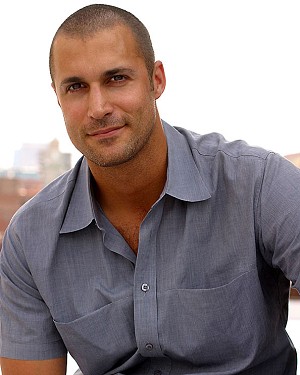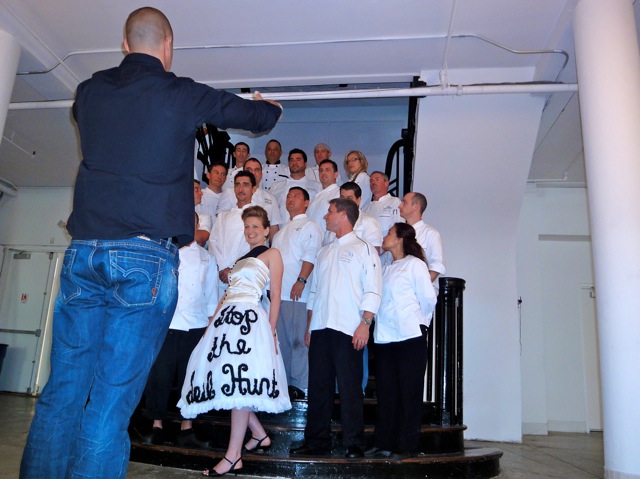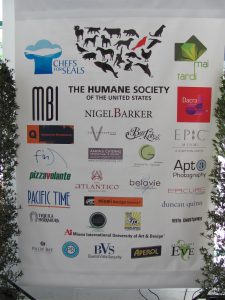
The Humane Society of the United States recently presented ‘Chefs for Seals’ in Miami’s Design District. Chefs for Seals is a celebration of seals where more than 70 compassionate restaurants in Miami are working together with The Humane Society of the United States to encourage Canada to end its commercial seal slaughter.
Nigel Barker, noted photographer and judge on “America’s Next Top Model,” serves as spokesperson for the campaign. In 2008, Barker accompanied the HSUS team to document and photograph the seal nursery and hunt. The pictures from the trip were on exhibition during the photo shoot at the Moore Building in the Design District.
During the VIP reception, Barker photographed local chefs who are supporting the cause. Chefs in attendance include: Todd Mark Miller (STK, Coco de Ville); Allen Susser (Chef Allen’s); Michael Gilligan (W Hotel); Gerdy Rodriguez (Mia); Giancarla Bodoni (Escopazzo); Philippe Ruiz (Palme d’ Or); Pascal Oudin (Pascal’s on Ponce); Sam Gorenstein (BLT); John Critchley, (Area 31); Michael Psilakus (Eos); Sean McTiernan (The Viceroy); Douglas Rodriguez, Michelle Bernstein, Michael Schwartz, Giancarla Bodoni, Fredrick Kelly (JB Kitchen and Bar) and Chad Ford (DeVito South Beach).
Barker expressed to Premier Guide Miami his involvement with the project and what he hopes to accomplish from this campaign.
PGM: How do you get a handle on getting countries like Canada to stop the hunting of seals?
Nigel Barker: The bottom line is, people make changes all the time, and extraordinary dramatic legislation has happened in the past. In fact, just recently, due to the Humane Society’s efforts there has been a total ban on the import of seal products into Europe. It used to be legal in the U.S., it’s now banned. Things do change, things do happen, and you have to move people. It just isn’t always easy. You have to be dedicated, committed, and you have to keep at it. things like this take a very long time, and I would like for it to be over yesterday. We are working towards it and we do see big strides. Today is a day to show everybody how many people are getting together and supporting the ban on Canadian seafood, and also supporting the Humane Society the ban of seal hunt.
PGM: How long have you been involved with this cause and why?
Nigel Barker: I have been involved from a very long time. As a child, my parents were big supporters of the Humane Society, and actually, I marched with my parents in London, in the 70’s against the seal hunt. It has been going on for literally a very long time, certainly 30 to 40 years in the commercial sense. The indigenous people of Canada have been hunting them forever; we haven’t got a problem with that. They eat the meat, use the bones for tools, and utilize the rest of it. Most recently, my involvement as official spokesperson for the Humane Society of the U.S. and Humane Society international. It is because of someone who works in the fashion industry, the fur on these animals is used in the fur trade in fashion, so I feel directly responsible in some respects, for my industry is a big part of the reason why we have this. It’s not like they are killing them because they want to feed people with the meat, that’s just not the case. People do eat it every now and then, but it is very rare. All the hunting I have seen with all the animals, the remains are thrown in the water and discarded.
PGM: What is the main message you would like for people to take from your involvement with this cause?
Nigel Barker: Many messages. The main message is that the hunt is still happening, and we need to stop it. I think a lot of people, especially the U.S. don’t realize the hunt is still taking place. They often ask, “What can we do about it?” Well what you can do, is boycott Canadian seafood. Unfortunately, I would love to think that my imagery of both the birth of the seals that you are witnessing in this gallery, and the one of the actual hunt, which are very brutal and graphic in nature will be enough to move people to stop it. I think it is atrocious, unfortunately the world is not like that, I would be naive to think that was the case. Financially is where it boils down to, if you hit them in the pockets, they will realize they are going to lose trade with the U.S., a boycott can do that because they are not selling fish to the U.S., that is a huge marketplace. The fact that we have almost 100 chefs from Miami here today from restaurants all over like China Grill and others; they sell a lot of seafood, that means their money is going elsewhere and that’s over US$400 million since we started the boycott and over 5000 restaurateurs in the U.S. including chains like Whole Foods. It is really a powerful boycott.
PGM: Have you seen any kind of momentum over the past 5 years? Obviously you and your family have put a lot of efforts into this cause, have you seen an increase of people/general public getting involved?
Nigel Barker: That is what this is about. There has been a huge increase. The fact that the boycott was not around, now we have 5000 people, that’s an increase over the past 5 years. Since i have been involved, we have had the ban in the EU. The EU was importing seals for only last year-now they are not. The price of seal fell. When I first started it was almost $100 a piece, now they are only $12. There is no demand, so they can’t sell them, and because there is no demand-no one is buying them. No one is going to hunt for them-why try to kill them? It costs too much to get the boats out there. Last year where the seal hunt happened and we witnessed it, the coast guards in Canada spend over $8 million just paying to repair ships because they were getting damaged in the water. Several sealers actually drowned trying to get these seals because their boats turned over. Now that kind of loss of human lives is wretched, as well. I am not here to point finger, and I am not trying to say all these people are bad people, because they are not. All of them are fishermen, and they really don’t know much different and they have to feed their families. What I would like to do is to offer an alternative. I have offered to donate all my pictures to the Canadian government to help with their Eco-tourism opportunity. I wish that Canada would really honor the seal as opposed to killing it in the way they do. It is an unnecessary blemish on their otherwise good record of good environmental issues.
PGM: How many pieces are you donating to Canada, and how long did it take to complete this project?
Nigel Barker: This show has been around for a very long time, and this is not the first time we have done this. We have taken this exhibition all over the world. I have actually traveled all over Europe and there is multiple versions of it, including a film that is being released called, “Seal of Fate.”